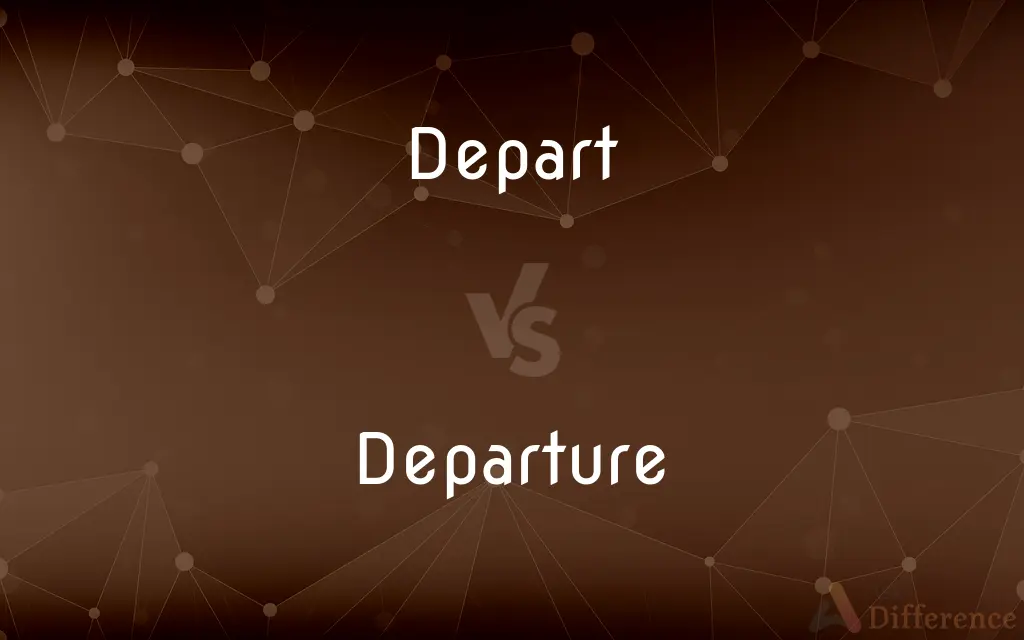Depart vs. Departure — What's the Difference?
By Maham Liaqat & Urooj Arif — Updated on March 20, 2024
Depart is a verb meaning to leave, especially to start a journey, while departure is a noun referring to the act of leaving or the instance of departing.

Difference Between Depart and Departure
Table of Contents
ADVERTISEMENT
Key Differences
Depart is used to describe the action of leaving a place or the initiation of a journey. It is an active verb that implies movement away from a location or the beginning of a travel. For example, when someone says, "We plan to depart at dawn," it signifies the intention to start moving away from their current location at a specified time. On the other hand, departure is the noun form that denotes the act or event of departing. It encapsulates the concept or instance of leaving rather than the action itself. When referring to a departure, as in "The departure was delayed due to bad weather," it focuses on the event or circumstance surrounding the act of leaving.
Depart can be used in various contexts beyond physical travel, such as departing from a topic of conversation or departing from traditional practices, implying a leaving behind or moving away from a metaphorical position or stance. In contrast, departure, as a noun, is often used more concretely to describe the moment or process of leaving, but it can also refer to a deviation from the norm, such as in the phrase "a departure from the usual procedure."
The use of depart is typically associated with the subject performing the action, highlighting the entity that is leaving or embarking on a journey. Departure, being a noun, often focuses on the event itself or the conditions surrounding it, and it can be used in a broader range of contexts, including schedules, plans, and metaphorical departures from norms or expectations.
In summary, depart emphasizes the action and the agent involved in leaving, while departure highlights the occurrence or condition of the act of leaving, serving as a focal point for discussions around timing, reasons, and the nature of the leave-taking.
Comparison Chart
Part of Speech
Verb
Noun
ADVERTISEMENT
Definition
To leave, especially to start a journey.
The act of leaving or the instance of departing.
Usage
Describes the action of leaving or starting a journey.
Refers to the event, condition, or concept of leaving.
Contexts
Physical travel, metaphorical shifts (e.g., departing from a topic), initiating action.
Physical leaving, scheduled events (e.g., flight departures), deviations from norms.
Focus
On the subject performing the action.
On the event, circumstances, or concept of leaving.
Example
"The train departs at 8 PM."
"The departure of the flight was postponed."
Compare with Definitions
Depart
To leave a place, typically to start a journey.
We will depart from New York tonight.
Departure
The act of leaving a place.
The departure was scheduled for early morning, but fog caused a delay.
Depart
To diverge or deviate from a path, standard, or topic.
Let's not depart from the agenda during the meeting.
Departure
A deviation from an accepted, prescribed, or traditional course.
The artist's latest work is a significant departure from his earlier style.
Depart
To leave a state of being or condition.
He departed from his usual demeanor that day.
Departure
The initiation of a new course or journey.
Their departure for Mars marks a new era in space exploration.
Depart
To move away from or leave behind.
It's time to depart from outdated practices.
Departure
A specific instance of leaving, especially in the context of travel.
Please check the departure board for the latest flight information.
Depart
To begin a new phase or venture.
She departs for college this fall, starting a new chapter in her life.
Departure
An instance of diverging from a norm or expectation.
His sudden departure from the company protocol surprised everyone.
Depart
To go away; leave
I depart for the islands at noon.
Departure
The act of leaving.
Depart
To die.
Departure
A starting out, as on a trip or a new course of action.
Depart
To vary, as from a regular course; deviate
Depart from custom.
Departure
A divergence or deviation, as from an established rule, plan, or procedure
Ordered curry as a departure from his usual bland diet.
Depart
To go away from; leave
"I departed the oppressive building quickly ... without a backward glance" (Joyce Carol Oates).
Departure
(Nautical) The distance sailed due east or west by a ship on its course.
Depart
(intransitive) To leave.
Departure
The act of departing or something that has departed.
The departure was scheduled for noon.
Depart
(intransitive) To set out on a journey.
Departure
A deviation from a plan or procedure.
There are several significant departures, however, from current practice.
Depart
To die.
Departure
(navigation) The distance due east or west made by a ship in its course reckoned in plane sailing as the product of the distance sailed and the sine of the angle made by the course with the meridian.
Depart
To disappear, vanish; to cease to exist.
Departure
(surveying) The difference in easting between the two ends of a line or curve.
The area is computed by latitudes and departures.
Depart
(intransitive) To deviate (from), be different (from), fail to conform.
His latest statements seemed to depart from party policy somewhat.
To depart from a title or defence in legal pleading
Departure
(legal) The desertion by a party to any pleading of the ground taken by him in his last antecedent pleading, and the adoption of another
Depart
(transitive) To go away from; to leave.
Departure
(obsolete) Division; separation; putting away.
Depart
To divide up; to distribute, share.
Departure
Division; separation; putting away.
No other remedy . . . but absolute departure.
Depart
To separate, part.
Departure
Separation or removal from a place; the act or process of departing or going away.
Departure from this happy place.
Depart
(obsolete) Division; separation, as of compound substances.
Departure
Deviation or abandonment, as from or of a rule or course of action, a plan, or a purpose.
Any departure from a national standard.
Depart
(obsolete) A going away; departure.
Departure
The desertion by a party to any pleading of the ground taken by him in his last antecedent pleading, and the adoption of another.
Depart
To part; to divide; to separate.
Departure
The distance due east or west which a person or ship passes over in going along an oblique line.
Depart
To go forth or away; to quit, leave, or separate, as from a place or a person; to withdraw; - opposed to arrive; - often with from before the place, person, or thing left, and for or to before the destination.
I will depart to mine own land.
Ere thou from hence depart.
He which hath no stomach to this fight,Let him depart.
Departure
Act of departing
Depart
To forsake; to abandon; to desist or deviate (from); not to adhere to; - with from; as, we can not depart from our rules; to depart from a title or defense in legal pleading.
If the plan of the convention be found to depart from republican principles.
Departure
A variation that deviates from the standard or norm;
The deviation from the mean
Depart
To pass away; to perish.
The glory is departed from Israel.
Depart
To quit this world; to die.
Lord, now lettest thou thy servant depart in peace.
Depart
To divide in order to share; to apportion.
And here is gold, and that full great plentee,That shall departed been among us three.
Depart
To leave; to depart from.
Depart
Division; separation, as of compound substances into their ingredients.
The chymists have a liquor called water of depart.
Depart
Move away from a place into another direction;
Go away before I start to cry
The train departs at noon
Depart
Be at variance with; be out of line with
Depart
Leave;
The family took off for Florida
Depart
Go away or leave
Depart
Remove oneself from an association with or participation in;
She wants to leave
The teenager left home
She left her position with the Red Cross
He left the Senate after two terms
After 20 years with the same company, she pulled up stakes
Depart
Wander from a direct or straight course
Common Curiosities
Is "departure" always related to travel?
While often associated with travel, "departure" can also refer to deviations from norms, plans, or traditional practices.
How does "depart" relate to scheduled events?
"Depart" relates to the action or intention of leaving at a scheduled time, as in transportation or the start of a journey.
Can "departure" refer to a person?
"Departure" can refer to a person in the sense of their leaving a place or position, but it focuses more on the act or event than the person.
How do you use "departure" in a sentence?
"The departure of the ship is set for noon."
Can "departure" be used to describe someone's death?
While less common, "departure" can be used euphemistically to describe someone's death, especially in formal or literary contexts.
Is "departing" the same as "leaving"?
"Departing" is synonymous with "leaving" but often implies the start of a journey or a more formal or scheduled leave-taking.
How do you use "depart" in a sentence?
"They plan to depart early to avoid traffic."
Can "depart" be used in non-physical contexts?
Yes, "depart" can be used metaphorically to describe leaving a topic, deviating from norms, or changing a course of action.
How do "depart" and "departure" differ in emotional connotation?
"Depart" can carry a more active or urgent connotation, while "departure" might evoke a sense of planning, process, or solemnity.
Can a project or plan have a "departure"?
Yes, a project or plan can have a "departure" in terms of deviating from the original course or introducing a new direction.
Share Your Discovery

Previous Comparison
Galvanometer vs. Voltmeter
Next Comparison
Piety vs. PiousAuthor Spotlight
Written by
Maham LiaqatCo-written by
Urooj ArifUrooj is a skilled content writer at Ask Difference, known for her exceptional ability to simplify complex topics into engaging and informative content. With a passion for research and a flair for clear, concise writing, she consistently delivers articles that resonate with our diverse audience.
















































